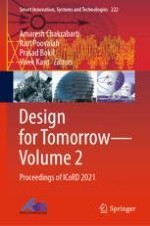2021 | OriginalPaper | Chapter
10. A Tool to Design a User-Centred Town Plan
Authors : Abhishek Singh, Pratul Chandra Kalita
Published in: Design for Tomorrow—Volume 2
Publisher: Springer Singapore
Activate our intelligent search to find suitable subject content or patents.
Select sections of text to find matching patents with Artificial Intelligence. powered by
Select sections of text to find additional relevant content using AI-assisted search. powered by
